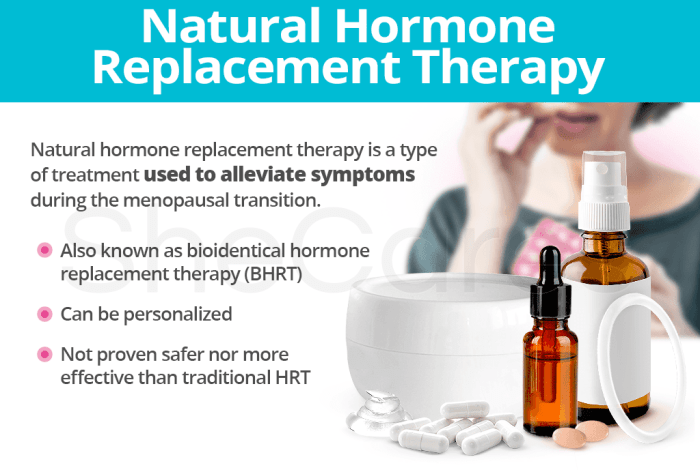Natural hormone replacement therapy (NHRT) has emerged as a promising approach to managing hormonal imbalances, offering a safe and effective way to restore balance and enhance well-being. By utilizing hormones derived from natural sources, NHRT aims to alleviate symptoms associated with conditions like menopause, andropause, and thyroid disorders.
This comprehensive guide delves into the world of NHRT, exploring its various forms, the hormones used, conditions treated, and potential benefits and risks. We’ll also discuss important considerations before starting NHRT, the need for regular monitoring and follow-up, and alternative approaches to managing hormone imbalances.
Introduction

Natural hormone replacement therapy (NHRT) is a treatment option that uses bioidentical hormones to address hormonal imbalances.
NHRT aims to restore hormonal balance and alleviate symptoms associated with hormonal decline, such as hot flashes, night sweats, vaginal dryness, and mood swings. It can also help improve sleep, energy levels, and cognitive function.
Benefits of NHRT
- Alleviates symptoms of hormonal imbalances, such as hot flashes, night sweats, vaginal dryness, and mood swings.
- Improves sleep, energy levels, and cognitive function.
- Reduces the risk of chronic diseases associated with hormonal imbalances, such as osteoporosis and heart disease.
- Enhances overall well-being and quality of life.
Types of NHRT
Natural hormone replacement therapy (NHRT) can be administered through various methods, each with its own advantages and disadvantages. The choice of method depends on individual needs and preferences, as well as the type of hormone being replaced.
Oral Medications
Oral medications are taken by mouth and are a convenient and cost-effective option for NHRT. They are available in various forms, including tablets, capsules, and liquids. However, oral medications can have a negative impact on the liver and may interact with other medications.
Transdermal Patches
Transdermal patches are applied to the skin and release hormones through the skin. They are a discreet and convenient option, but they can be expensive and may cause skin irritation in some people.
Injections
Injections are given directly into the muscle or under the skin. They provide a precise dose of hormones and can be used to treat severe hormone deficiencies. However, injections can be painful and require regular medical visits.
Creams or Gels
Creams or gels are applied directly to the skin and are absorbed through the skin. They are a convenient and non-invasive option, but they may not be as effective as other methods of NHRT.
Hormones Used in NHRT
Natural hormone replacement therapy (NHRT) utilizes various hormones to address hormonal imbalances. These hormones are identical to those naturally produced by the body and are derived from plant or animal sources.
Estrogen
- Estrogen is a hormone primarily responsible for female reproductive health and development.
- It plays a crucial role in regulating the menstrual cycle, maintaining bone density, and protecting against cardiovascular disease.
- Estrogen is commonly used in NHRT to alleviate symptoms of menopause, such as hot flashes, night sweats, and vaginal dryness.
Progesterone
- Progesterone works in conjunction with estrogen to regulate the menstrual cycle and prepare the uterus for pregnancy.
- It also has calming effects and helps to reduce anxiety and sleep disturbances.
- Progesterone is often used in NHRT to balance the effects of estrogen and minimize the risk of uterine hyperplasia.
Testosterone
- Testosterone is a hormone primarily associated with male characteristics, but it also plays a role in female health.
- It contributes to muscle mass, bone density, libido, and cognitive function.
- Testosterone may be used in NHRT to address symptoms of low testosterone levels, such as fatigue, decreased libido, and loss of muscle mass.
DHEA
- Dehydroepiandrosterone (DHEA) is a precursor hormone that the body converts into other hormones, including estrogen and testosterone.
- DHEA levels decline with age, and supplementation may help to improve mood, energy levels, and cognitive function.
- It is important to note that DHEA should only be used under the guidance of a healthcare professional due to potential side effects.
Conditions Treated with NHRT
Natural hormone replacement therapy (NHRT) is a treatment option for individuals experiencing hormonal imbalances. It involves replacing hormones that are naturally produced by the body but have declined due to various factors such as aging, menopause, or medical conditions.
NHRT can effectively manage a range of conditions, including:
Menopause
- Relieves symptoms such as hot flashes, night sweats, vaginal dryness, and mood swings.
- Protects against long-term health risks associated with estrogen deficiency, such as osteoporosis and cardiovascular disease.
Andropause
- Improves symptoms such as low libido, erectile dysfunction, fatigue, and muscle loss.
- Maintains muscle mass, bone density, and overall well-being.
Hypothyroidism
- Replenishes thyroid hormones, which are essential for metabolism, growth, and development.
- Alleviates symptoms such as fatigue, weight gain, constipation, and dry skin.
Adrenal insufficiency
- Provides hormones such as cortisol and aldosterone, which are crucial for stress response, blood pressure regulation, and electrolyte balance.
- Manages symptoms such as fatigue, weakness, weight loss, and low blood pressure.
Benefits and Risks of NHRT
Natural hormone replacement therapy (NHRT) offers a range of potential benefits, but it also comes with certain risks. Understanding both sides of the equation is crucial for making informed decisions about NHRT.
Benefits of NHRT:
- Symptom relief:NHRT can effectively alleviate symptoms associated with hormonal imbalances, such as hot flashes, night sweats, vaginal dryness, and mood swings.
- Improved mood:Hormonal imbalances can lead to depression, anxiety, and irritability. NHRT can help balance hormones and improve mood.
- Increased energy:Hormonal imbalances can cause fatigue and low energy levels. NHRT can help restore hormonal balance and boost energy.
Risks of NHRT:
- Side effects:Some people experience side effects from NHRT, such as breast tenderness, bloating, and headaches. These side effects are usually mild and subside over time.
- Potential health concerns:There are some potential health concerns associated with NHRT, including an increased risk of breast cancer, blood clots, and stroke. However, the risks are small and should be discussed with a healthcare professional.
Considerations for NHRT
Before starting NHRT, several factors should be considered to ensure its suitability and potential benefits.
Age:Age is a significant factor as hormone levels naturally decline with age. NHRT may be more beneficial for individuals experiencing symptoms of hormonal imbalance due to aging.
Medical History
A thorough medical history is crucial to determine any underlying health conditions that may affect NHRT. Conditions such as cancer, blood clots, or liver disease may require caution or contraindicate NHRT.
Lifestyle
Lifestyle factors, such as smoking, alcohol consumption, and diet, can influence hormone metabolism and response to NHRT. These factors should be discussed with a healthcare professional to optimize treatment outcomes.
Other Medications
Certain medications, such as blood thinners or antidepressants, may interact with NHRT. It is essential to disclose all medications being taken to ensure safe and effective treatment.
Monitoring and Follow-up
Regular monitoring and follow-up are crucial during natural hormone replacement therapy (NHRT) to ensure optimal outcomes and minimize risks.
Tracking Hormone Levels
Monitoring hormone levels is essential to determine if NHRT is effectively restoring hormonal balance. Blood tests can measure hormone levels, including estrogen, progesterone, testosterone, and DHEA. By tracking these levels, healthcare providers can adjust the dosage of NHRT as needed to achieve the desired therapeutic effects.
Evaluating Treatment Effectiveness
Follow-up visits allow healthcare providers to evaluate the effectiveness of NHRT. Patients may report improvements in symptoms, such as hot flashes, night sweats, mood swings, and vaginal dryness. Healthcare providers can also assess the overall well-being and quality of life of patients undergoing NHRT.
Adjusting Dosage as Needed
Based on the results of hormone level monitoring and treatment evaluation, healthcare providers may adjust the dosage of NHRT. This is important to ensure that patients are receiving the optimal dose to achieve their therapeutic goals while minimizing the risk of side effects.
Alternatives to NHRT

Natural hormone replacement therapy (NHRT) is not the only option for managing hormone imbalances. There are several alternative approaches that can be explored, including lifestyle modifications, dietary changes, and herbal supplements.
It is important to consult with a healthcare professional before making any significant changes to your hormone management plan. They can help you determine the best approach based on your individual needs and health history.
Lifestyle Modifications
- Exercise:Regular exercise can help improve hormone balance by reducing stress levels, increasing blood flow, and promoting the release of endorphins.
- Stress management:Chronic stress can disrupt hormone production. Techniques such as yoga, meditation, and deep breathing can help reduce stress and improve hormone balance.
- Sleep:Getting enough sleep is essential for hormone regulation. Aim for 7-9 hours of quality sleep each night.
- Quit smoking:Smoking can interfere with hormone production and metabolism.
- Limit alcohol consumption:Excessive alcohol consumption can disrupt hormone balance.
Dietary Changes
- Eat a healthy diet:A balanced diet rich in fruits, vegetables, and whole grains can provide the nutrients needed for hormone production.
- Include phytoestrogens:Phytoestrogens are plant compounds that have estrogen-like effects. They can be found in foods such as soybeans, tofu, and flaxseeds.
- Avoid processed foods:Processed foods are often high in sugar, unhealthy fats, and chemicals that can disrupt hormone balance.
- Limit caffeine intake:Excessive caffeine consumption can interfere with hormone production.
Herbal Supplements, Natural hormone replacement therapy
Certain herbal supplements have been shown to have hormone-balancing effects. However, it is important to note that these supplements can interact with medications and have potential side effects. It is essential to consult with a healthcare professional before using any herbal supplements.
- Chasteberry:Chasteberry is a herb that has been traditionally used to treat menstrual irregularities and hormonal imbalances.
- Black cohosh:Black cohosh is another herb that has been used to relieve menopausal symptoms and balance hormones.
- Red clover:Red clover contains isoflavones, which are phytoestrogens that can help balance hormones.
- Maca root:Maca root is a Peruvian herb that has been shown to support hormonal balance and improve fertility.
Concluding Remarks

Natural hormone replacement therapy offers a personalized and effective approach to addressing hormonal imbalances. By understanding the different types, hormones, and considerations involved, individuals can make informed decisions about whether NHRT is right for them. Whether it’s managing menopausal symptoms, boosting energy levels, or improving overall well-being, NHRT has the potential to restore balance and enhance the quality of life.
Questions Often Asked: Natural Hormone Replacement Therapy
What are the different types of NHRT?
NHRT can be administered through oral medications, transdermal patches, injections, creams, or gels.
What hormones are commonly used in NHRT?
Estrogen, progesterone, testosterone, and DHEA are the most commonly used hormones in NHRT.
What conditions can NHRT help manage?
NHRT can help manage conditions such as menopause, andropause, hypothyroidism, and adrenal insufficiency.